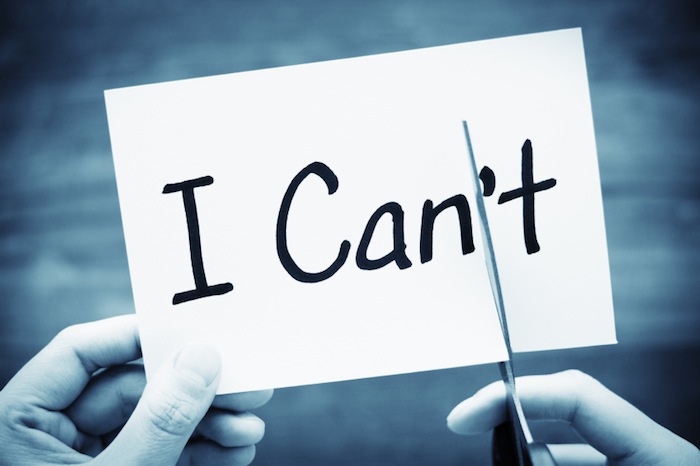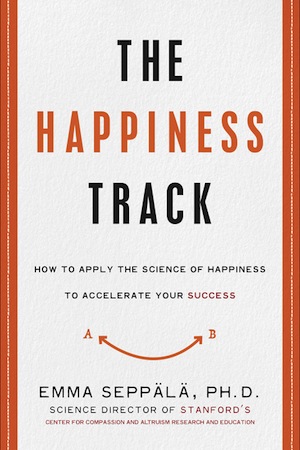Want to be more successful, starting today? Emma Seppälä PhD, author of The Happiness Track: how to apply the science of happiness to accelerate your success, reveals five secrets that can accelerate success
Everyone wants to be happy and successful, and yet the pursuit has never seemed more elusive. Emma Seppälä, science director of the Center of Compassion and Altruism Research and Education at Stanford University, says that applying happiness in the right way can lead you to success. Here are her five secrets of how applying happiness can make you successful.
Unleash your charismatic side
In her book The Happiness Track, Seppälä says that charisma is often considered a gift, but studies have found that charisma is not so much a gift but a learnable skill, and the key to this skill is learning to be fully present. In other words, stop thinking about the future, and focus on the now. Here are a few tips on how to develop your charisma:
Good listening skills – If you find that you interrupt people, or you can’t wait to interject your two cents when another person is talking, then you’re not truly listening because you’re thinking of yourself. If you’re distracted, or thinking about what to say next then you’re not truly listening, and you’re not truly present.
Eye contact is one of the most powerful forms of human connection
Eye contact – Eye contact is one of the most powerful forms of human connection. We intuitively feel that when someone’s gaze shifts from us, their attention has also shifted away from us. When you’re present and looking someone in the eye, the impact of that connection can be powerful. In addition to feeling heard, people actually feel seen.
Self Confidence – The ability to act authentically and with assurance without worrying about what other people think. Many people are so busy worrying about how they appear that they end up coming across as nervous or inauthentic. When you are fully present, you are focused on the others rather than yourself. As a consequence, you naturally come across as confident, composed, genuine, and natural.
MORE: 5 healthy holidays under £700
Learn how to calm your mind and body
Seppälä advises that certain activities can help to balance your nervous system, restore your energy, and calm the mind, such as yoga, walking your dog in nature, or cuddling with your child. These activities slow down your thoughts, and bring ease to your body and nervous system. Here are some examples Seppälä suggests will calm your mind and body:
Studies have shown that a simple walk in nature can significantly decrease anxiety, preserve positive mood, and even improve memory
Go for a walk – Studies have shown that a simple walk in nature (as opposed to an urban environment) can significantly decrease anxiety, preserve positive mood, and even improve memory. Research on awe, which is often inspired by beautiful sceneries like a starlit sky or a vast horizon, suggests that it slows our perception of time (which is the opposite of what happens with stress) by bringing us into the present moment, and thereby enhances well-being and decreases stress.
Engage in slow-paced activities – If running is your way to relieve stress, try also including slower-paced exercise into your schedule. Look for activities that don’t involve too much intensity and strain. If you usually go for a hot yoga or power class, instead try yin yoga (a slow-paced style of yoga with poses that are held for longer periods of time), restorative yoga (which centres your breath and body, supported by props that allow you to fully relax), or tai chi (a martial art that combines deep breathing and relaxation, with slow and gentle movements). Seppälä advices to select an activity that is deliberately slow and doesn’t involve much effort.
hugs are associated with lower stress-related health problems
Hug a loved one – Although it often seems that our schedules are too busy for spending time with friends or family, other than a quick catch-up call in the car on the way to work, it’s worth it to carve out opportunities to be in the presence of loved ones and share physical affection. One study even showed that hugs are associated with lower stress-related health problems.
Take a technology fast
Seppälä says try to spend a half day or whole day on a technology fast, ideally in nature, without a schedule, and let your mind rest and relax.
having the discipline to stick to your goals in the face of distractions, such as feeling the urge to check your Facebook, is critical to success
She suggests that talking aimless walks, or contemplating the sky are great ways to allow your mind to relax and wind down. At first it may feel strange and uncomfortable, Seppälä explains, but your mind will get used to it, and in turn it will learn how to relax. It will also allow you to practise self-control. Seppälä believes that having the discipline to stick to your goals in the face of distractions, such as feeling the urge to check your Facebook, is critical to success.
MORE: 8 ways to boost work productivity by taking breaks OFTEN
Just stop with the self-criticisism
Seppälä says it may seem obvious that harsh self-criticism can be destructive, we tend to engage in it quite frequently in the belief that it will do us good. For example, ‘I’m lazy’, ‘I give up too easily,’ ‘I’m not smart enough.’ We’re often our own worst critics. We also believe that self-criticism pushes us to perform better and to live up to higher standards.
Research shows that when you are excessively self-critical, you damage both your psychological well-being and your chances at success
Research shows, however, that when you are excessively self-critical, you damage both your psychological well-being and your chances at success. Kristin Neff, associate professor of human development at the University of Texas, points out that self-criticism is an important predictor of anxiety and depression and, rather than being a motivator, it can actually prevent you from trying again after failure for fear of failing once more.
self-criticism increases fear of failure
Seppälä believes that not only can self-criticism increase fear of failure, but being a self-critic encourages you to start thinking about what’s wrong with you, which of course takes a psychological toll. Seppälä says that ‘fear of failure, when excessive, stands directly in the way of success,’ and she explains that it means you’re more likely to give up, it can hurt your performance, lead to poor decision making, and make you lose touch with what you really want.
Be more compassionate – it’s good for your health
Unlike self-focus, compassionate and positive relationships with others are associated with 50 per cent increased likelihood of longevity, buffering against health effects of stress, a strengthened immune system, reduced inflammation, and lower rates of anxiety and depression.
Seppälä explains that another reason compassion boosts our health is that is helps us recover quicker in the face of life’s stresses. A study conducted on over eight hundred people found that high levels of stress generally foretold earlier mortality – except individuals who engaged in volunteer work.
compassionate and positive relation-ships with others are associated with 50 per cent increased likelihood of longevity
Whether compassion benefits health and emotional well-being, however, does depend on what motivates those acts of compassion, says Seppälä. Apparently, the individuals who engaged in volunteerism lived longer than their non-volunteering peers only if their reasons for volunteering were altruistic rather than self-serving. So in other words, exercising compassion and helping others must come from a genuine desire to do so and not be an act of self-interest.
MORE: Brian training: 7 surprising hacks to give your mind a boost
Seppälä says there are three ways you can use to strengthen your compassion muscle:
Pay full attention when others are talking – According to Seppälä, when you talk to someone, try to listen to the other person’s words, and notice how they expresses themselves. Watch their facial expressions, particularly the eyes. Research shows you can read people’s emotions through their gaze. By listening to and watching the person, we can put ourselves in their shoes and respond appropriately or extend our support.
A study conducted on over eight hundred people found that high levels of stress generally foretold earlier mortality – except individuals who engaged in volunteer work
Verbalise the other person’s point of view – Seppälä says that another way you can empathise with someone is to verbalise the emotion you observe they are feeling. Next time you are in a difficult conversation, try to acknowledge the other person’s emotions. For example, you might say ‘You seem upset today, please let me know if there is anything I can do to support you.’ Seppälä explains that this type of response could improve your relationship with the person as they will feel heard and understood.
Attend a compassion-training program – Seppälä believes that compassion-training classes can decrease stress hormones and inflammation, help you to become kinder towards others as well as yourself, and strengthen your ability to regulate your emotions.
Emma Seppälä, Ph.D is Science Director of Stanford University’s Center for Compassion and Altruism Research and Education, and a leading expert on health psychology, well-being, and resilience.
Follow her on twitter: @emmaseppala
Like this article? Sign up to our newsletter to get more articles like this delivered straight to your inbox.




























































